You started your blog. You worked your numbers. You figured out how to grow, find and engage your target audience. It’s all paid off and you finally got your very first sponsored campaign! Now what? How do you write a sponsored post? Where do you start?
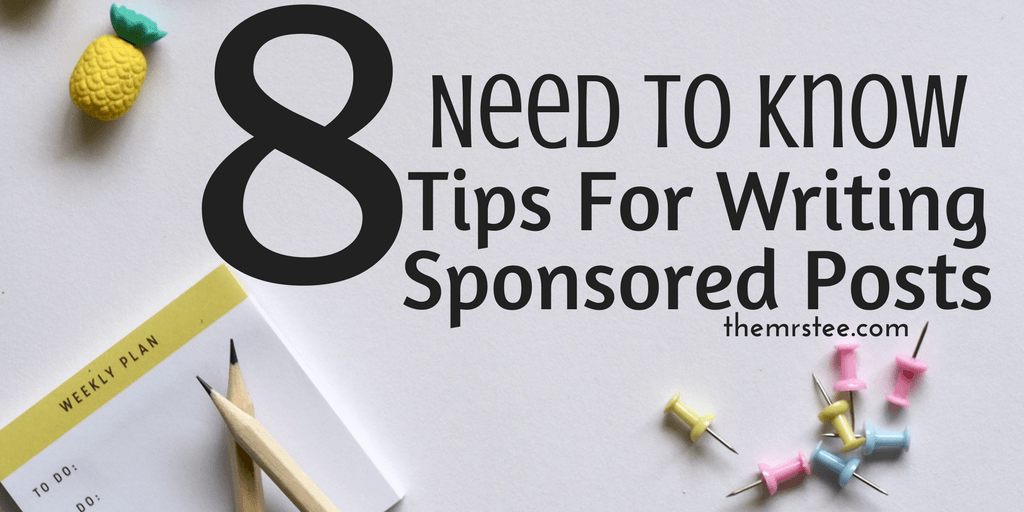
The following tips will help you write your very first or very next sponsored post in a creative and professional way with as little heartache and stress as possible.
What Is A Sponsored Post?
First let’s define what a Sponsored Post actually is. A Sponsored Post is a Blog Post that is ‘sponsored‘ by a Brand, Company, Person, etc. through an exchange of payment or product.
1. Disclosure Policy
A Disclosure is a notification to your audience that the following content is being shared in exchange for a payment or product. Sponsored Posts must be clearly disclosed (as per FTC requirements) at the very start of your written post.
Simple Disclosure Example:
Disclosure of Material Connection: This is a “sponsored post.” The company who sponsored it compensated me via a cash payment, gift, or something else of value to write it. Regardless, I only recommend products or services I use personally and believe will be good for my readers. I am disclosing this in accordance with the Federal Trade Commission’s 16 CFR, Part 255: “Guides Concerning the Use of Endorsements and Testimonials in Advertising.”
Disclosures must be place before any outgoing links for the Brand or Company are listed. The best place to include them are at the very beginning of your post.
[tweetthis]Why Sponsored Posts Need Disclosures + Get A Sample Disclosure . . . #TipsToBlogBy #TheMrsTee[/tweetthis]
2. No Follow Links
What Are No Follow Links?
No Follow Links are basically a way to notify search engine bots (i.e Google) when links you have included within your posts lead to an external URL (outside of your own site) that these links should not add to that site’s ranking within the search engine’s index. Basically the clicks to those links will not count towards that site’s PageRank – it tell’s the bots not to count them at all.
What Are Do Follow Links?
Do Follow Links allow you to share the link support by giving a boost to the links from your site through each click they receive. These links are ranked and counted by search engines to help increase the influence of the sites they lead to.
Why No Follow Only for Sponsored Posts?
Adding the No Follow code to links within a Sponsored Post helps you avoid giving endorsements to links you are being paid to include. Google considers Follow Links for paid content to be unfair to other sites. For this reason they require all paid link shares to be disclosed to them using the No Follow code.
Will A Brand Ask For Do Follow?
Yes. I have been approached by Brands to include their links as Do Follow. Personally I feel these are Brands who are trying to gain the extra ranking through the Do Follow links with disregard to the damage it could have on my site’s standing with Google and other search engines.
I always explain why I don’t include Do Follow links. If they are not willing to accept my explanation I feel it is best for me not to work with them. Don’t be afraid to turn down a post.
[tweetthis]Why No Follow Links Matter in a Sponsored Post . . . #TipsToBlogBy #TheMrsTee[/tweetthis]
How To Add A No Follow Link
Adding a No Follow Link to your post is pretty easy. It’s just a bit of code added to the HTML side of the link itself. WordPress makes this as easy as installing a No Follow PlugIn to your site. Once added, this PlugIn will give you the option right on your Dashboard to check ‘No Follow’ as well as ‘Open Link In New Window/Tab’ for any link you insert within your post.
Here is the PlugIn I currently use: Get It HERE
3. Know The Brand
Do your research. Brands will provide a general outline of the product, campaign, target audience, etc. Yet doing your own research helps bring your own voice to the sharing of that information. The more you know about the Brand itself, what it does, how it came about and where it is going – the easier it is to incorporate those points within your story in a natural way.
[tweetthis]Do Your Research! Know the Brand Your Representing in A Sponsored Post #TipsToBlogBy #TheMrsTee [/tweetthis]
4. Telling The Story
Part of writing a Sponsored Post is to tell the story of the brand. Brands reach out to Bloggers based not only on numbers and reach but on the character of their content, style of their writing and how they think both will factor in to the reach of their brand on that Blogger’s site.
Creating the foundation of a Sponsored Post is more than simply including the right links and tagging the right pages (though we will get to that later). The strongest foundation for any piece of content is your unique perspective – after all that’s why the Brand has decided to work with you.
This is where the art of storytelling comes into play. You want to weave your voice into the information you are sharing on behalf of the campaign. If you’re writing for a cleaning product and you’re a mom include how that product helps you in your day-to-day life with your children and family. Go beyond replicating the key points given to you and find a way to include them into your natural writing style and content.
If Brands simply wanted to send out multiple versions of the same content they would release a Press Release and nothing more. By requesting your point of view they also want you to include the part of your voice that draws your audience.
Creating your post in this way will help your content not resonate with the Brand but more importantly with your audience. It’s still your message to share.
5. Word Count
You’ve written the most amazing story to tell how or why this product/brand is something your support and recommend. You’ve included your Disclosure, covered the Brand’s key points, included their links and added the No Follow code.
Here is the part I think many may forget to check when writing a Sponsored Post – the Word Count. Yup. In all that you’ve done how many words did it take for you to get there?
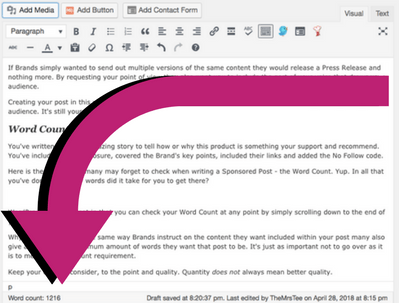
WordPress is kinda great in that you can check your Word Count at any point by simply scrolling down to the end of your post and looking.
Why is this important? The same way Brands instruct on the content they want included within your post many also give a minimum or maximum amount of words they want that post to be. It’s just as important not to go over as it is to meet the word count requirement.
Keep your content consider, to the point and quality. Quantity does not always mean better quality.
6. Images
Images are almost always a part of the content requested for a Sponsored Post. Image requirements can be those provided by the Brand or images you are asked to take of the product, service or brand as you use it within your life. Show the product but show in natural way that relates to how it is included in your life. Allow the images to weave the product in much as your words and content.
Most Brands require between 3-5 images. Now don’t worry, this doesn’t mean you have to go buy a DSLR! Today’s smartphones have the camera settings that can equal those of a DSLR – use them! Utilize background, daylight and most of all your unique perspective.
Once you’ve taken your images and have them uploaded within the post be sure to consider placement. Make sure you utilize images to benefit the flow of your post. A well-placed image can help break up long strings of text and keep the attention of your readers.
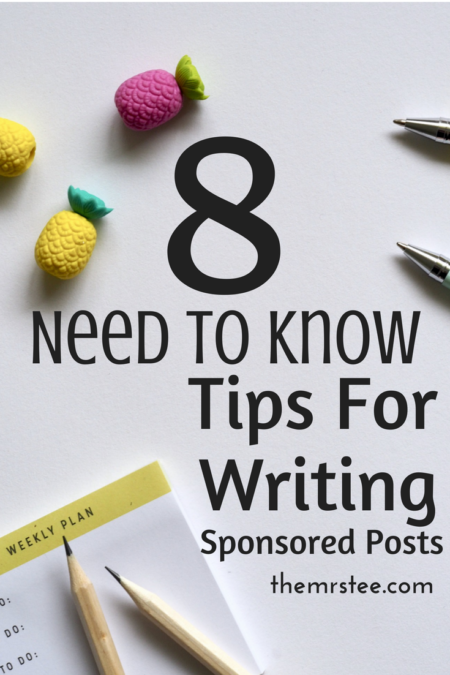
7. Social Shares
Disclosing your sponsored content doesn’t end at your post. Next up are the Social Shares of that post. Like any content your create on your site you want to promote your Sponsored Post across your social media. Many Brand require a minimum amount of shares across specified platforms (Facebook, Twitter, Instagram, etc.).
When sharing your content on these platforms you need to continue to let your audience know this content is being produced and shared in exchange for payment or product. This is done through the hashtags #AD or #Sponsored. This is normally in addition to any campaign specific hashtags.
Also included within social shares are tags. This is when you included the Brand within the post through either an ‘@’ tag (on Twitter or Instagram) or through the use of the Facebook Branded Content Tool.
8. Know Your Deadline
Sponsored Posts are more often than not sensitive. This means the Brand will need your content completed, published and promoted within a set time frame. Be aware of your deadlines. Some Brands have Draft Submission requirements where they want the opportunity to review your content and give any needed edits prior to it being published. 
If you’re guilty of procrastination – like me, trick yourself into completing early. Set your deadline a few days before the Brand’s true deadline that way even if you put things off a bit you will still be on time!
That’s it! My 8 Need To Know Tips for Writing a Sponsored Post. These tips can help you make your very first Sponsored Post your very best. Now . . .
Do you have any tips for Writing A Sponsored Post?
Share Them With Me!
- The ‘Dirt’ on Dirty Whiskey Craft Cocktail Bar – August 6, 2021
- I Never Went To Prom – Will A Fashion Show Do? – May 1, 2021
- Cape Fear Regional Theatre – Best In The House – May 1, 2021

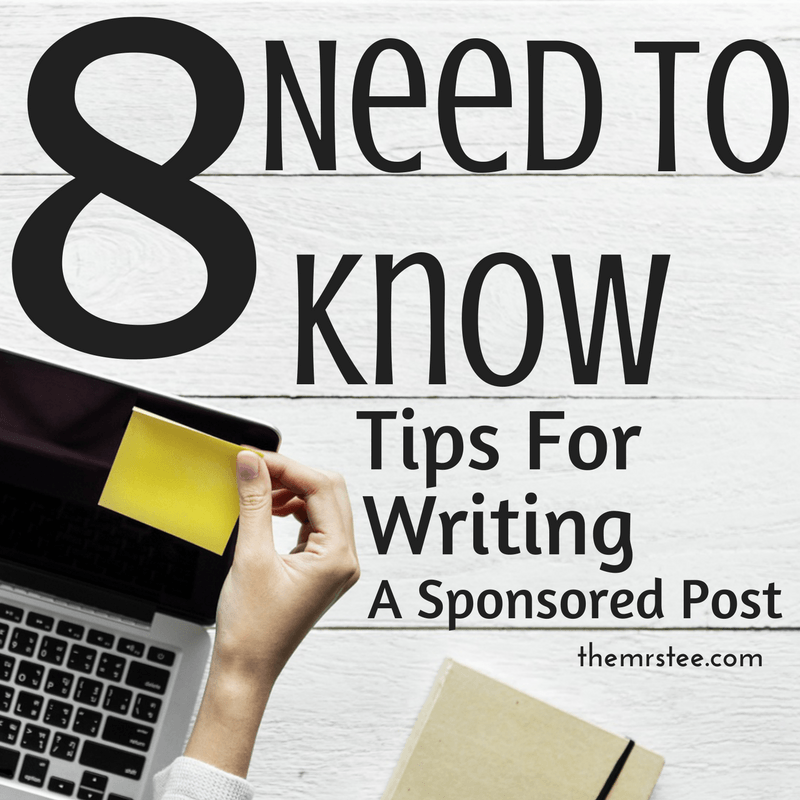
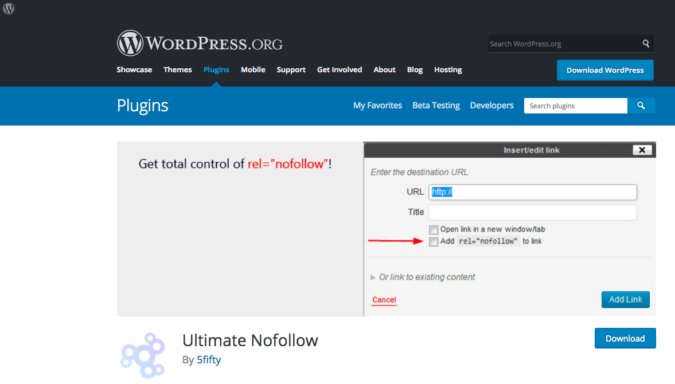





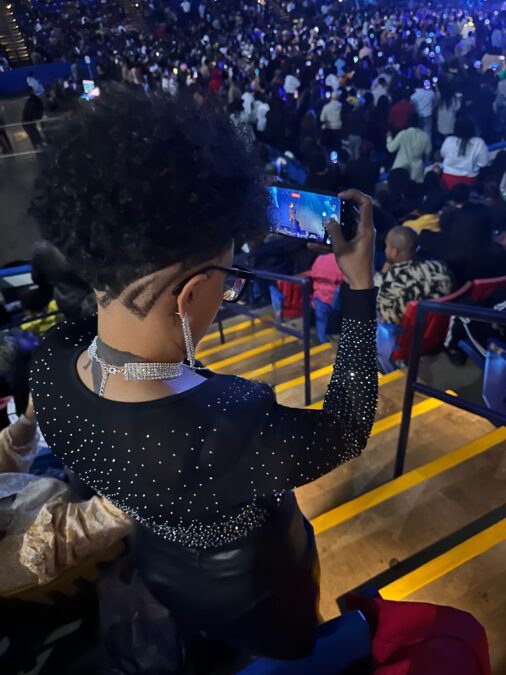
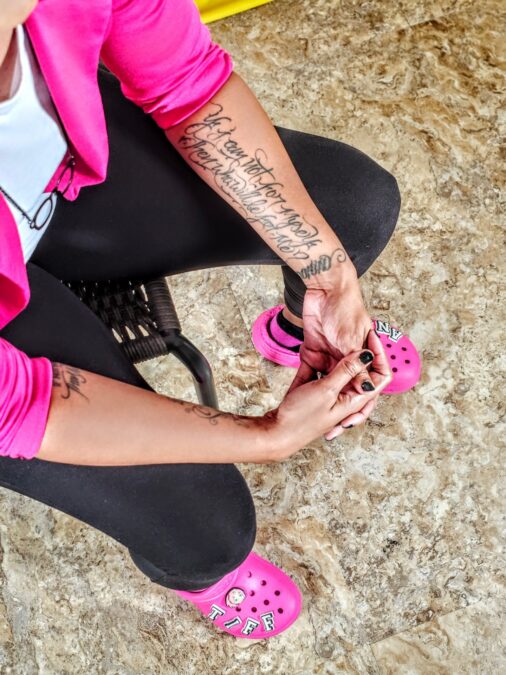

Leave a Reply